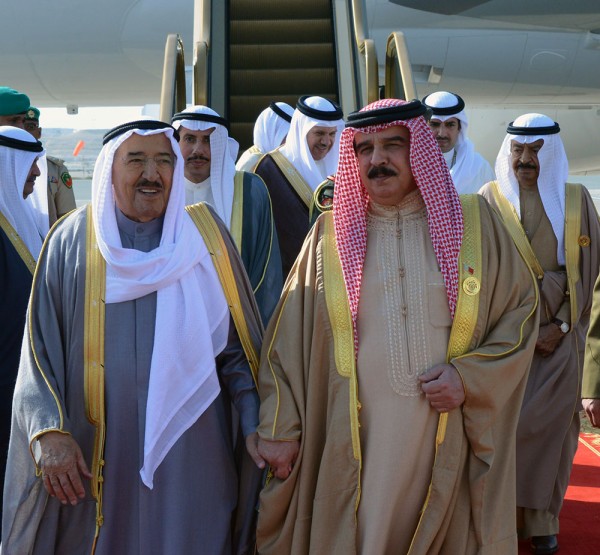Why Al Khalifa Turned their Back on their Cousins in Kuwait, Most Dangerous Roles of Late Emir Sabah Al-Ahmad Al-Sabah

2020-10-15 - 4:47 am
Bahrain Mirror (Exclusive): Despite the many roles played by the late Emir of Kuwait, Sheikh Sabah Al-Ahmad Al-Sabah, it can be said that the role he played at the end of his life, reining in the Gulf duo Mohammed bin Salman, Crown Prince of Saudi Arabia, and Mohammed bin Zayed, Crown Prince of Abu Dhabi, was the biggest role he has played in his life in terms of foreign policy.
The late prince knew the truth of their dangerous project they were preparing for and the project of isolating Qatar was just an introduction, if successful, it would inevitably be followed by subjugating Kuwait and then Oman, and controlling their sovereign decision-making.
The next step, then, would be the ultimate goal: to clash with Iran and Iraq and try to break them, with the Israelis being the spearhead of this project.
The introduction of this insane project was the submission of all Gulf States. Kuwait can't approve entering such a project, thus the Kuwaiti Emir initiated the announcement of his mediation between the three Gulf States (Saudi Arabia, UAE and Bahrain) and Qatar
At a very opportune time, he went to Washington to stop the most dangerous step of invading Qatar by these three countries, which he succeeded in. During a joint conference with US President Donald Trump, the Kuwaiti emir revealed this step and said "Thank God, we stopped a military intervention."
The boycotting countries were infuriated. Among them was the former Bahraini Foreign Minister Khalid Al Khalifa, who denied what the Emir of Kuwait had said and wrote on Twitter, "His Highness knows that the military escalation did not come from the countries boycotting Qatar". He then tweeted voicing his anger at those above him, saying "our countries did not and will not seek any military threat. They, as the world knows them, will not allow any small or large party to threaten the security and stability of its peoples."
Hours later, the three countries issued a statement in which they responded to the Emir of Kuwait, saying that they regretted what he said about the success of the Kuwaiti mediation to halt a military intervention.
Bahrain mobilized its media tool, Sawsan Al-Shaer, who wondered during a television interview with Al-Arabiya Channel about Kuwait and Oman's stance and said: "The ball is now in Kuwait and Oman's court to determine their position; what is their position towards a country that still insists on its subversive policy?" Kuwait, for its part, responded to Sawsan Al-Shaer, through Kuwaiti MP Safa Al-Hashem, who said that "neutrality is a position. The wise Sheikh Sabah took the role of a mediator, isn't neutrality a position? Isn't taking the role of mediator for reconciliation a position? I ask you, have the countries boycotting Qatar, consulted Kuwait and Oman before the announcement of the boycott?"
The Kuwaiti government's vision was not wrong, as a series of documents published by the U.S. newspaper "Daily Beast", leaked from the email of the UAE ambassador to the United States Yousef al-Otaiba, including correspondences from 2014 to 2017, reveal several details about the communications of the UAE Embassy in US with public relations companies to tarnish the image of Washington's allies and influence its foreign policy.
The documents revealed that the UAE Embassy had made a concerted effort to reduce Qatar's regional role and incite targeting it politically and security-wise and accuse it, along with Kuwait, of financing terrorist acts.
The second step, which the late Emir has stuck to, is his announced rejection of normalization with the Israeli entity, which has already happened so far, as Kuwait has continued to declare time and time again with unequivocal clarity that it will not enter this project and will not participate in it, because it knows that complete submission and abandonment of its independence and sovereign decision will follow such a step. Sahab Al-Ahmad didn't accept his country to become an Israeli protectorate.
Saeb Erekat, the chief Palestinian negotiator, said on September 15 that "what happened from the UAE and Bahrain sides, on one hand, and from the Israel and US sides, on the other hand, cannot be called a peace treaty or peace for peace. What happened is called peace for protection."
For these reasons, Al Khalifa had a cold stance towards their cousins, Al-Sabah, and this estrangement increased more with the death of Sheikh Sabah, the emir of humanitarian action.
Even today, days after the death of Sheikh Sabah Al-Ahmad, Bahrain's King Hamad bin Isa Al Khalifa has made no outstanding humanitarian gesture of real symbolism. He did not perform his duty towards his cousins, and has merely done a symbolic act to avoid being blamed and sent his son, Crown Prince Sheikh Salman bin Hamad Al Khalifa, after a two-day deliberate delay.
To this extent, the Bahraini decision became dependent on Riyadh and Abu Dhabi. The king did not attend the funeral of his cousin, but was busy the next day continuing to consolidate the new relationship with Israel, and to follow up on his son Sheikh Nasser bin Hamad Al Khalifa's meeting with the Mossad Chief, Yossi Cohen, publicly in Bahrain.
- 2017-10-19Head of Most Famous Report in Bahrain’s History Meets his End, Leaves Mark on Memories of Bahrainis
- 2017-01-19The Long Scenario of Death
- 2016-01-20What Is Jamal Khashoggi Doing in Cyprus: Worst Scenario for Divided Island Following Bahrain!
- 2015-05-27Bahrain’s Crown Prince: I am a Philosopher, Believe Me!
- 2015-05-12The Bahraini Cleric Sheikh Jalal Al-Sharqi: I am a Takfiri and I Have an Authorization